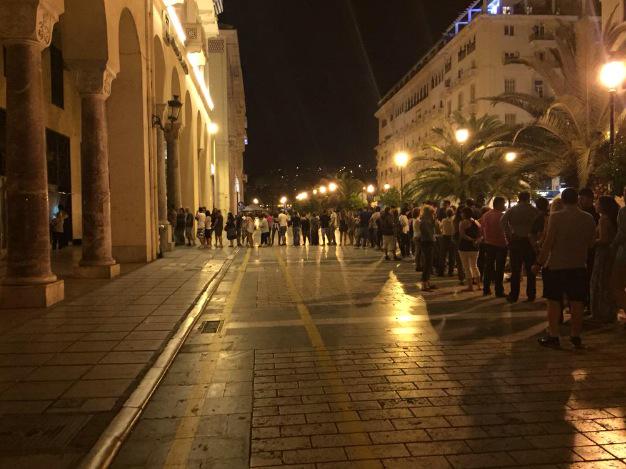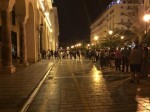submitted by jwithrow.
Journal of a Wayward Philosopher
When Countries Go Bankrupt
June 30, 2015
Hot Springs, VA
The S&P closed out Monday at $2,058. Gold closed at $1,179 per ounce. Oil checked out at $58 per barrel, and the 10-year Treasury rate closed at 2.33%. Bitcoin is trading up around $262 per BTC as the Greek crisis continues to play out.
Dear Journal,
I have been musing on the modern credit system in my last few journal entries and, ‘lo and behold, Greece has presented us with a real-time example of what happens when the credit expansion hits the wall.
Panos Kammenos, head of the government’s coalition ally in Greece, appeared on local television this past Saturday. “Citizens should not be scared, there is no blackmail,” Kammenos assured the Greek people. “The banks won’t shut, the ATMs will (have cash). All this is exaggeration.”
The very next day Prime Minister Alexis Tsipras announced that banks in Greece would not open on Monday. “In the coming days, what’s needed is patience and composure,” Tsipras proclaimed. “The bank deposits of the Greek people are fully secure.”
Here are the details of the Greek government’s capital controls:
- From Monday, June 29, 2015, banks will remain closed up to and including Monday, July 6
- Deposits are fully safeguarded
- The payment of pensions is exempted from the restrictions on banking transactions.
- Management of credit institutions will announce how these will be paid
- Electronic transactions within the country won’t be affected. All transactions with credit or debit cards and other electronic forms (web banking, phone banking) can be conducted as normal
- Prepaid cards may be used to the limit existing before the beginning of the bank holiday
- From midday June 29, ATMs will operate with a daily cash withdrawal limit of 60 euros per card, which is equivalent to 1,800 euros a month
- Foreign tourists can make cash withdrawals from ATMs with their cards without restrictions provided these have been issued abroad
- A special Committee to Approve Bank Transactions has been established at the State General Accounting Office in cooperation with the Finance Ministry, the Bank of Greece, the Union of Greek Banks and the Capital Markets Commission. This committee will deal with applications for urgent and imperative payments that can’t be satisfied through the cash withdrawal limits or by electronic transactions (e.g. payments abroad for health reasons). Wages paid electronically to bank accounts aren’t affected.
Wisely, rather than heeding the Prime Minister’s call for patience, the people of Greece stormed ATM’s, gas stations, and grocery stores. There are pictures up all over the internet showing empty shelves in Greek grocery stores, gas lines, and masses of people lined up to get their allowed 60 euros out of an ATM. They know the banks will be closed all week so there will be no one to replenish the ATM when it runs out of cash. That must be a gut-wrenching feeling.
I pay zero attention to the mainstream media but I catch stray bits and pieces of mainstream coverage every now and then, no matter how quickly I duck and roll. It looks like a portion of the media is blaming the Greek fiasco on laziness and a lack of work-ethic. While there are pockets of this in every population, the truth is the Greek people are no more responsible for their government’s debt than American citizens are responsible for the U.S. national debt. Maybe you can fault them for listening to and voting for fast-talking politicians, but people in every country are guilty of that transgression. The man on the street in Athens, Greece, just like the man on the street in Athens, GA, has very little understanding of how the fiat monetary system enables central banks and governments to pyramid debt on top of debt to serve their own interests at the expense of the populace.
Also, it is important to remember that these are real people. The media may not understand that, but we decent human beings should. See that old lady standing in the ATM line? That’s someone’s grandmother. She has likely been taxed her entire life to help pay for all of her government’s waste and now she is standing in an ATM line at night because the government has frozen her bank accounts.
This is what it looks like when countries go bankrupt. While the banks appear to be private entities, in reality they are pseudo-government organizations. They have a government charter, they use government currency, they accept government deposit insurance and guarantees, and they are backed by a government-sanctioned central bank. Thus, the banks ultimately answer to the government. When government says it wants financial records, the banks hand them over. When the government says that people can only withdraw 60 euros of their own money on any given day, the banks make that happen. When the government says the banks must close for a week, the bankers stay home.
What’s true of Greek banks is true of banks in every country, including the U.S. Almost every nation in the world employs the same central bank-driven, government-dominated fiat monetary system that enables the irresponsible modern credit system I have been writing about.
Greece just found the limit of exponential credit expansion, as did Cyprus back in 2013. The response was the same in both cases – abrupt bank holidays and capital controls to prevent people from getting their money out of the financial system. When the banks finally reopened in Cyprus, people found that money had been taken from their deposit accounts and used to “bail-in” the banks. We’ll see if that is the case in Greece as well next week.
Any decent person would call this illegal and immoral but government calls it necessary. They will save the banks at any cost which is why they always prevent people from getting to their money in times of crisis. Why do governments always save the banks? Because the banks are key partners in the monetization and perpetuation of government debt, of course! They are two sides of the same coin.
One day a similar crisis will hit the U.S. and you can bet the response will be the same. This will likely happen to numerous other western nations first, but the day of reckoning for the fiscal irresponsibility in the U.S. will come. The U.S. is already insolvent – that’s step one. Step two is denial.. then anger.. then eventually bankruptcy. That’s the bad news.
The good news is, like Bill Belichik, we already know the other team’s game plan so all we have to do is prepare accordingly. Food, gas, and cash always disappear quickly during financial dislocations so we should keep a little extra food and water in the house, maintain secondary energy sources, and keep some cash outside of the financial system.
For food and water: keep a deep pantry including items with a long shelf life and stock up on bottled water. Check out longer-term food storage options at sites like Efoods direct if you want to expand on this.
Secondary energy sources could be propane grills with extra propane tanks, solar-compatible power sources, and/or old-fashioned wood burning stoves. These secondary energy sources will give you the ability to cook, produce heat, and run your fridge/freezer no matter how bad it gets. Pair these energy sources with food and water storage and you shouldn’t need to even leave your home when such a crisis hits.
For cash: keeping a little extra paper currency around is a good idea, but precious metals and bitcoins are far superior forms of money. Gold is a fantastic preserver of wealth and silver is great for transactional purposes. At the very least be sure to have some silver eagles or junk silver coins in the house for this reason. You can buy silver from various dealers online or at your local coin shop. Bitcoin’s biggest weakness is that you can’t use it if the power goes out – which often happens during times of crisis – but it’s power as a medium of exchange outside of the financial system makes it worth the risk. Picture this: with Bitcoin you can press a button on your smart phone (or computer) and transfer money to anyone, anywhere in the world nearly instantaneously. It doesn’t matter if the banks are closed because bitcoins exchange outside of the financial system altogether. Get to know Bitcoin at Blockchain.info and Coinbase.com.
These preparations are a bit tedious and they do require a small financial commitment. Your family and friends will probably consider you a bit eccentric for doing these things because most people do not think they are necessary. Most people see the Greek crisis on the news and in the headlines and say “that couldn’t happen here”. Maybe they laugh and call the Greeks lazy. Most people will be standing in an ATM line of their own or storming their local grocery store when it is eventually discovered that their country is bankrupt too. Don’t be like most people.
More to come,
Joe Withrow
Wayward Philosopher
For more of Joe’s thoughts on the “Great Reset” and the fallacy of central planning please read “The Individual is Rising: 2nd edition” which will be available later this year. Please sign up for the notifications mailing list at http://www.theindividualisrising.com/.

